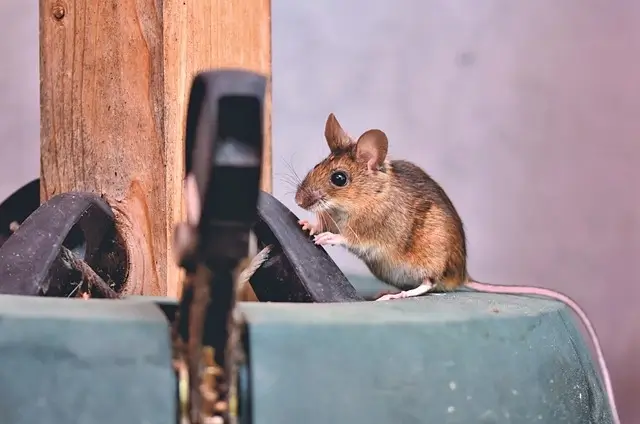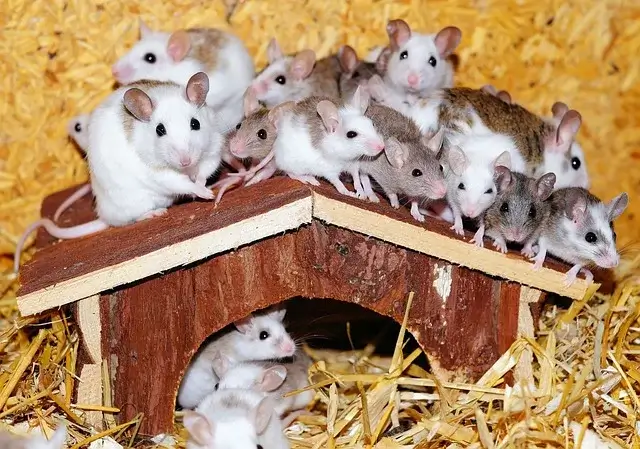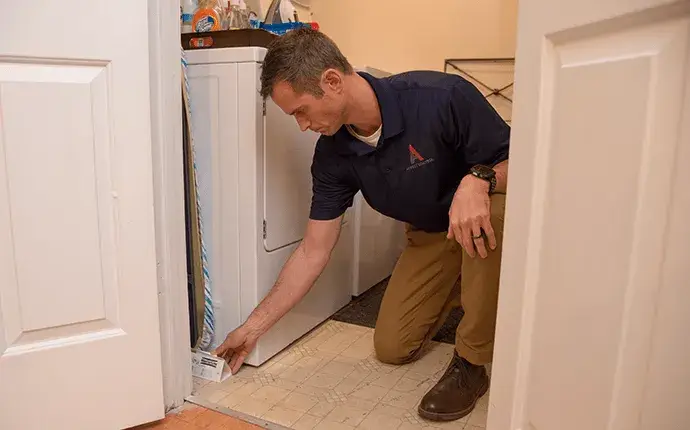
How to Spot the Early Signs of Rodent Infestations Before Winter Hits

As temperatures drop, mice, rats, and other rodents seek shelter in our warm and cozy homes. If left unchecked, these pests can cause major damage and health concerns for homeowners. Recognizing the early signs of infestations before the cold weather sets in can help you with rodent prevention before the problem gets out of hand.
At A-1 Pest Control, we proudly serve Lenoir, Blowing Rock, Hickory, Mooresville, West Jefferson, Hendersonville, and the surrounding areas to meet your pest control needs. Whether you’re looking for rodent prevention, termite control, or regular maintenance, our Western North Carolina team is ready to assist!
Signs of Rodent Infestation
These are some telltale signs of a rodent infestation that you should be on the lookout for.
Unusual Droppings
One of the most obvious signs of a rodent infestation is also one of the most off-putting: droppings. Rodent droppings are typically small, dark, and pellet-shaped, often found near food sources, inside pantries, under sinks, or along baseboards. Fresh droppings are moist and dark, while older droppings become dry and gray. If you notice a sudden appearance of these droppings, it’s a sign that you may need to look into rodent prevention.
Gnaw Marks and Damaged Materials
Rodents constantly chew to keep their teeth sharp and gnaw on just about anything—wood, wires, plastic, and even insulation. Spotting gnaw marks on furniture, wires, or food packaging is a clear sign that rodents are in your home. Chewed wires are particularly dangerous because they can create a fire hazard.
Strange Sounds in the Walls or Ceilings
Hearing scratching, scurrying, or squeaking noises in your walls or ceilings, especially at night, could indicate rodent activity. Mice and rats are most active when it’s quiet, and they tend to stay hidden during the day, making their presence difficult to detect unless you know just what you’re looking for.
These noises often come from spaces like attics, crawl spaces, and inside walls where rodents create nests and travel through.
Unusual Pet Behavior
If you have pets, they may alert you to a rodent problem before you even realize it. Cats and dogs often become fixated on certain areas where they can sense or hear rodents. If your pet is acting strangely, like pawing at walls, floors, or cabinets, it might be worth checking for signs of rodent activity.
Foul Odors
Rodents can leave behind a musky odor that’s especially noticeable in enclosed spaces such as attics, basements, or inside cabinets. This smell can come from their urine, droppings, or nesting materials. If there’s a strong, unpleasant odor that seems to be getting worse, it may be time for a rodent prevention or pest control team.
Grease Marks Along Baseboards
Rodents often follow the same paths when moving around your home, and as they travel, their fur leaves behind greasy marks on walls, floors, and baseboards. These smudges or streaks, especially if they appear near floorboards or in tight spaces, can indicate frequent rodent activity in specific areas of your home.
Nesting Materials
Rodents build nests out of shredded materials like paper, fabric, and insulation. If you find small piles of these materials in corners, attics, or behind appliances, it’s a strong sign that rodents are making themselves at home.
You might also notice burrowing activity in areas such as under kitchen cabinets or inside pantries where food is accessible.
What You Can Do if You Spot These Signs
Rodents are experts at staying hidden, so if you’re seeing signs of their presence, the problem might already be more advanced than it seems. Still, there are steps you can take to stop the infestation from getting worse.
Seal Entry Points
One of the first and most important steps in rodent prevention is stopping their access to your home. Rodents can squeeze through openings as small as a dime, so make sure to thoroughly inspect your home’s exterior for potential entry points.
Check for cracks or gaps around:
- The foundation and walls
- Doors and windows, particularly weatherstripping
- Utility lines, such as water, gas, and electrical lines
- Vents and chimneys
- Rooflines and eaves
If you find any openings, use materials like steel wool, caulk, or heavy-duty mesh to seal them. For larger holes or structural damage, consider hiring a professional to ensure the area is properly repaired.
Remove Food Sources
Rodents are drawn to homes not just for warmth but also for easy access to food. By cutting off their food supply, you can discourage them from sticking around.
- Store all food (including pet food) in sealed, airtight containers made of glass or metal. Rodents can’t chew through these, so try to use them as often as possible.
- Clean up any food spills or crumbs immediately, especially in areas like the kitchen, dining room, and pantry.
- Dispose of garbage regularly, and make sure your trash cans have tight-fitting lids to prevent rodents from rummaging through your waste.
- Avoid leaving pet food or water dishes out overnight, as this can attract rodents looking for a quick meal.
Even small amounts of food, such as crumbs under the refrigerator or spilled grains in the pantry, can sustain a rodent population.
Declutter and Clean
Rodents love cluttered spaces because they provide plenty of places to hide and some cozy nesting materials. Basements, attics, garages, and storage rooms are prime areas for rodents to build nests if they are filled with unnecessary clutter. To minimize the risk:
- Organize storage areas by using plastic, rodent-proof containers instead of cardboard boxes.
- Regularly declutter spaces, getting rid of piles of paper, fabric, or other soft materials that rodents might use to build nests.
- Keep your home clean, paying attention to rarely cleaned areas like behind appliances, under furniture, and in corners.
In addition to eliminating nesting spots, regular cleaning helps you stay vigilant for any new signs of rodent activity, such as droppings, grease marks, or gnaw marks.
Monitor for Continued Activity
After sealing entry points, removing food sources, and decluttering, it’s important to stay on top of the situation by continuing to monitor for signs of rodent activity. If you spot any fresh droppings, hear new scratching noises, or see gnaw marks, it may indicate that the infestation is ongoing or that new rodents have found their way into your home.
Call in the Professionals
DIY methods, such as traps or bait, can help in the short term, but they may not be enough to eliminate a rodent infestation completely. Rodents are often clever at avoiding traps, and if they’ve established nests in hard-to-reach areas like inside walls or attics, rodent prevention can be difficult.
By contacting a professional pest control company like A-1 Pest Control, you can ensure that the infestation is dealt with thoroughly. Professionals can:
- Identify all potential entry points.
- Use safe and effective methods to remove the rodents.
- Set up preventative measures to stop future infestations.
- Provide ongoing monitoring and maintenance to ensure your home stays rodent-free.
Taking these steps as soon as you notice the signs of rodent activity will save you from bigger problems down the road, protect your home from damage, and safeguard your family’s health and well-being.
Taking these steps as soon as you notice the signs of rodent activity will save you from bigger problems down the road, protect your home from damage, and safeguard your family’s health and well-being.

Why It's Important to Identify a Rodent Infestation Before Winter
If you notice any of the early signs of a rodent infestation, it’s crucial to act quickly. Rodents, especially mice and rats, reproduce at a rapid rate. A single pair of mice can produce up to 60 offspring in just one year, and each new generation becomes reproductive in as little as six weeks. This means that a small issue can turn into a full-blown infestation in no time, leading to increased risks of damage to your home and potential health hazards.
Catching the problem early can also help you avoid the costs associated with extensive repairs and professional cleanup. Rodent prevention before winter ensures a more comfortable, pest-free environment for you and your family throughout the colder months.
Why a Rodent Infestation Can Be Dangerous
Rodent infestations pose several serious dangers to your home and health, making rodent prevention crucial. Here are some of the key risks:
Health Hazards
Rodents carry a variety of diseases that can be transmitted to humans, including hantavirus, leptospirosis, and salmonella. These diseases can be spread through direct contact with rodents or indirectly via contaminated food, surfaces, and even through rodent droppings or urine. The bacteria and viruses they carry can cause severe illness in both people and pets, especially in households with young children, the elderly, or individuals with compromised immune systems. Rodent prevention can keep these diseases out of your home and far away from your family.
Allergies and Respiratory Issues
Property Damage
Rodents have a constant need to gnaw to keep their teeth filed down. Unfortunately, they often chew on things like electrical wires, insulation, and wooden structures within your home.
Damaged wires can lead to electrical fires, while chewed insulation reduces energy efficiency and can result in higher heating costs during winter. The structural damage caused by rodents can weaken the integrity of walls, floors, and ceilings over time, leading to expensive repairs.
Contamination of Food and Surfaces
Rodents are notorious for contaminating food supplies and kitchen surfaces. They tend to raid pantries, chew through food packaging, and leave behind droppings and urine wherever they travel. This contamination can lead to foodborne illnesses, and the cleaning process can be a huge pain for homeowners.
Rapid Reproduction
One of the biggest dangers of a rodent infestation is how quickly it can grow. Rodents reproduce at an alarming rate, with mice able to have up to 10 litters per year. This means that a small infestation can become overwhelming within a short period of time, making it more difficult to control and eradicate.

Call A-1 Pest Control for Professional Rodent Prevention Assistance
While DIY methods can help reduce the chances of an infestation, professional pest control is often the most effective way to eliminate rodents for good. A-1 Pest Control offers expert rodent control services to identify entry points, remove rodents, and prevent future infestations.
Don’t wait for the problem to worsen. If you’ve noticed signs of rodent activity in your home, contact A-1 Pest Control today for a thorough inspection and comprehensive pest management plan. Taking action on rodent prevention early can save you time, money, and peace of mind as winter approaches.
Schedule Your Free Rodent Prevention Inspection Today
Experience the peace of mind that comes with a rodent-free home. Call 828-481-9140 or fill out the form below for a free estimate and our satisfaction guarantee.
"*" indicates required fields
